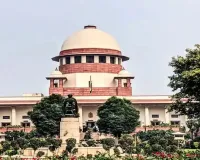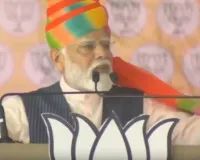
'Violates Article 14’: SC on Environmental Clearance to Soil Extraction for Linear Projects
New Delhi: In a setback to the Centre, the Supreme Court has partially quashed a four-year-old government notification, which permitted the extracting of earth for linear projects, such as roads and pipelines without environmental clearance, saying the completely unguided and blanket exemption was arbitrary and violative of Article 14 of the Constitution. The apex court felt the government showed “undue haste”, in issuing the notification during the “nationwide lockdown”.
The notification provided environmental clearance exemption for carrying out extraction or sourcing or borrowing of ordinary earth for linear projects such as roads and pipelines. A bench comprising Justices Abhay S Oka and Sanjay Karol said the notification was issued without inviting objections or opinions through the publication of prior notice. “There is no reason to dispense with this important requirement before publishing the impugned notification. Article 21 guarantees a right to live in a pollution-free environment. The citizens have a fundamental duty to protect and improve the environment”, said the bench, in a judgment delivered on March 21.
“Therefore, the participation of the citizens is very important, and it is taken care of by allowing them to raise objections to the proposed notification. After all, citizens are major stakeholders in environmental matters”, said the bench. According to the Centre, this requirement was dispensed with because the notification listing out the exemption was issued in the public interest.
The counsel, representing the petitioner, had submitted that such a blanket exemption would defeat the very object of enacting the Environment Protection (EP) Act. Citing an apex court judgment, the counsel submitted that the decision of this court and subsequent decisions mandated that there must be a requirement to obtain environmental clearance (EC) for the minor minerals pertaining to materials used for linear projects. She contended that allowing the extraction of the earth in such an indiscriminate manner is wholly arbitrary and violative of Article 14 of the Constitution.
Justice Oka, who authored the judgment on behalf of the bench, said that no reasons have been assigned by the Centre for coming to the conclusion that in the public interest, the requirement of prior publication of notice was required to be dispensed with. “We fail to understand the undue haste shown by the Central Government in issuing the impugned notification during the nationwide lockdown. Therefore, the inclusion of item 6 of the substituted Appendix-IX will have to be held illegal. We have already given reasons for not dealing with the challenge to item 7 of the impugned notification”, said Justice Oka.
The apex court made these observations, while partly allowing an appeal filed against the National Green Tribunal’s December 2020 order, which asked the Centre to revisit its 28 March 2020 notification. This notification modified the Union Ministry of Environment and Forest’s original notification on EC that was issued in September 2006 under the EP Act. The original notification stated that prior approval from the MoEF would be needed before any construction work for a new project or activity listed in a scheduled forest area is proposed.
Defending the March 2020 notification, the Centre argued that it was necessitated in view of the insertion of new provisions in the Mines and Minerals (Development and Regulation) Act, 1957. The notification said under the new section, 8B, of the MMDR Act, the successful bidder of a mining lease shall be “deemed to have acquired all valid rights, approvals, clearances, licenses and the like vested with the previous lessee for a period of two years”.
The bench said, “Only one conclusion can be drawn. The drastic decision to invoke sub-rule (4) of Rule 5 was made without any application of the mind. Hence, the decision-making process has been vitiated”.
The bench said importantly, “linear projects” have not been defined and without the definition, it is difficult to imagine which projects will be termed linear projects. “The term ‘linear projects’ is very vague. The process to be adopted for excavation has not been set out. Thus, item 6 is a case of completely unguided and blanket exemption, which is, per se, arbitrary and violative of Article 14 of the Constitution of India. There is no provision for setting up an authority which will decide whether a particular linear project is covered by item 6”, said the apex court.
About The Author

Related Posts
Post Comment
Latest News
 Flight Attendant Indicted In Attempt To Record Teen Girl In Airplane Bathroom
Flight Attendant Indicted In Attempt To Record Teen Girl In Airplane Bathroom











Comment List